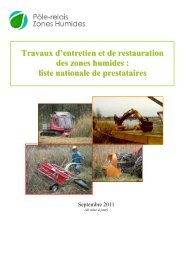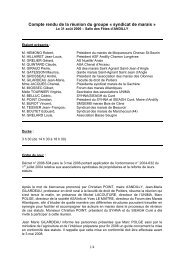Analyse des problématiques liées aux usages de l'eau en zones ...
Analyse des problématiques liées aux usages de l'eau en zones ...
Analyse des problématiques liées aux usages de l'eau en zones ...
You also want an ePaper? Increase the reach of your titles
YUMPU automatically turns print PDFs into web optimized ePapers that Google loves.
<strong>Analyse</strong> <strong><strong>de</strong>s</strong> <strong>problématiques</strong> <strong>liées</strong> à la propriété<br />
et <strong>aux</strong> <strong>usages</strong> <strong>de</strong> <strong>l'eau</strong> <strong>en</strong> zone humi<strong>de</strong><br />
RESUME<br />
Les <strong>zones</strong> humi<strong><strong>de</strong>s</strong> couvr<strong>en</strong>t 1,5 million d'hectares, soit 3% du territoire français. Ces <strong>zones</strong><br />
jou<strong>en</strong>t à la fois un rôle économique, pour les acteurs loc<strong>aux</strong>, mais aussi un rôle écologique<br />
fondam<strong>en</strong>tal, <strong>de</strong> part leur richesse. En effet, elles assur<strong>en</strong>t la conservation d'espèces animales et<br />
végétales et sont, égalem<strong>en</strong>t, un maillon important <strong><strong>de</strong>s</strong> bassins versants par leur rôle régulateur du<br />
régime <strong><strong>de</strong>s</strong> e<strong>aux</strong>.<br />
Cep<strong>en</strong>dant les <strong>zones</strong> humi<strong><strong>de</strong>s</strong> sont <strong>en</strong> danger. En effet, on déplore la disparition <strong>de</strong> 2,5<br />
millions d'hectares <strong>en</strong> 100 ans. Aujourd'hui, elles doiv<strong>en</strong>t faire face à la spéculation foncière due à leur<br />
attrait, à l'apparition <strong>de</strong> flou juridique <strong>en</strong> raison <strong>de</strong> l'évolution du domaine public maritime, ainsi<br />
qu'<strong>aux</strong> problèmes liés à la gestion collective <strong>de</strong> <strong>l'eau</strong>.<br />
De nombreux acteurs travaill<strong>en</strong>t à leur préservation mais, les intérêts personnels représ<strong>en</strong>t<strong>en</strong>t<br />
souv<strong>en</strong>t un obstacle à leur bonne gestion.<br />
Mots clés : Marais, domaine public, gestion collective <strong>de</strong> <strong>l'eau</strong>, association syndicale <strong>de</strong> propriétaire<br />
ABSTRACT<br />
In France, the wetlands cover 1,5 million hectares witch repres<strong>en</strong>t 3% of the territory. Besi<strong>de</strong><br />
their economic role these <strong>zones</strong> haves a fundam<strong>en</strong>tal ecological function, thank to their richness.<br />
In<strong>de</strong>ed, they <strong>en</strong>sure the conservation of animal species and flora, and are important for catchm<strong>en</strong>ts<br />
trough contributing to the regulation of the water regime.<br />
Yet, wetlands are <strong>en</strong>dangered. For the past hundred years 2,5 millions hectares of these lands<br />
have disappeared. Today owing to the attraction they repres<strong>en</strong>t, land speculation puts them in jeopardy<br />
because of the evolution of the public maritime domain with its legal inconcistancies, and the<br />
problems related to collective water managem<strong>en</strong>t.<br />
Many actors are working for their preservation but, private and personal interests oft<strong>en</strong> prevail<br />
repres<strong>en</strong>ting an obstacle to the good managem<strong>en</strong>t.<br />
Key words : Marsh, public domain, collective water managem<strong>en</strong>t, property owners' syndicate<br />
66









